April 05, 2007

I've seen almost every movie Kirsten Dunst has made. I think she's wonderful, and not just because she's half Scandinavian and half German, like me. In Marie Antoinette, just out on DVD, she gives a beautiful and sympathetic performance as someone I thought I was supposed to hate.
Only Sofia Coppola could have made this movie. It's very sensual, like all of her pictures. Lots of food, lots of pastels, lots of shoes (designed by Manolo), lots of flowers, lots of hair, and of course cake. It was filmed at Versailles — the Versailles — which is reason enough to see it.
Marie Antoinette's story is essentially a girl's story, and the movie never loses that perspective. It's told from her point of view alone, and thus the French Revolution never intrudes until the very end. That was the problem, you see. Court life was completely insulated from the real world, and Marie Antoinette really had no clue what was going on outside the palace borders.
She was an Austrian princess, who was sent to France to seal an alliance with the Holy Roman Empire by wedding the somewhat shy, but basically decent grandson of the Sun King. Louis XVI is played by Jason Schwartzman, who is Sofia Coppola's cousin.

After the wedding, Marie Antoinette's biggest problem is getting the dauphin to consummate the marriage. He's sort of an Eighteenth Century nerd, more interested in the inner workings of locks, than in producing an heir. Eventually, after a man-to-man talk from the Holy Roman Emperor himself, Louis is persuaded to do the deed.
Later, Marie Antoinette enters into a secret affair with Count Axel von Fersen of Sweden (A close confidant of Gustav III, the Swedish king assasinated during a masquerade ball, and whose blood stained costume I viewed last summer at the Livrustkammaren in Stockholm, a must-see museum, but I digress.) who's a real hottie. Louis never finds out in the movie, although historically there is some debate about whether the real Louis suspected that Fersen was the biological father of the dauphin.
Anyways, the movie is as slow and dreamy as one should expect from a Sofia Coppola flick. The photography is great, as is the set and costume design. Interestingly, the costumers made a conscious choice not to include any browns in the color palette, because they didn't want to suggest sepia tones, lest the viewer get the feeling it was a historical pic. Along the same lines, there's plenty of cool Eighties new wave in the soundtrack, to add a contemporary feel a la A Knight's Tale.
I gave Marie Antoinette four stars ("really liked it") on the Neflix scale of one to five. When I got back from Sweden, I rented Queen Christina with Garbo, and last month I saw and enjoyed Cleopatra. Now I'm inspired to rent Elizabeth with Cate Blanchett, to complete my quartet of movies about iconic queens.
Update: Casca asks an interesting question: "Do they show her head getting cut off?" Actually I debated last night whether to reveal the ending, but decided not to. This morning I changed my mind, so *SPOILER ALERT* she dies at the end.
Seriously though, there is one problem with the movie, and that is that they do not show Marie Antoinette getting beheaded. That didn't spoil the movie for me, and I totally understand Coppola's decision not to show it, but I think a lot of people (i.e. guys) will end up scratching their heads at the ending.
My boyfriend hated the movie. I think that's because it's a chick flick, and if you're doing a biography of Marie Antoinette, there's sort of an implicit promise that you're going to show her head getting chopped off. That's pretty much all most people know about the subject anyway. She says "let them eat cake," (which they show, but which she never said) and she gets her head cut off. So when the movie ends with Kirsten Dunst still having a head, there's a lack of resolution, and guys are all about resolution after the build-up.
For me, the movie was not about a chick who got beheaded. It was about the contrast between court life and the life of the common folk, whom we never get to see. To fully appreciate this subtlety, you have to go into it knowing the story of the French Revolution. You also have to have a well developed sense of irony, because the movie is infused with irony. Otherwise, when an aide tells Marie Antoinette that the people have no bread, and she responds by saying, quite seriously, "well the kids will just have to go without diamonds," you won't get it.
The queen was serious, but we the viewer know that her insulation from the populace has left her hopelessly naive — as if going without diamonds could stave off the reign of terror we know will come. So even though the Revolution is not shown, the knowledge that it is brewing animates the first two acts, but only if one knows the history. Otherwise its probably just a boring costume pageant.
Or maybe Chris thought Antonella Barba was going to be in it. Just kidding honey.
Posted by: annika at
11:18 PM
| Comments (17)
| Add Comment
Post contains 873 words, total size 5 kb.
March 05, 2007
Today's movie needs no introduction.

Cleopatra, 1963
This is the big one. Cleopatra is the most expensive American film ever made. Adjusted for inflation, it cost more to make than either Waterworld or Titanic. Only the Russian made War And Peace from 1968 cost more. The 44 million Cleopatra's producers spent by 1963 translates to over 285 million dollars today.
Cleopatra almost destroyed 20th Century Fox. For a time, it was the only movie in production from the studio. It's an example of how not to make a movie, if you want to save money. First, they completely rolled over for Elizabeth Taylor. Not only did they pay her million dollar asking price, with no counter-offer, they agreed to all her other demands including that it be made outside the U.S. When all was said and done (including a lawsuit filed by 20th Century Fox against Taylor and Burton) she ended up taking home 7 million.
Twentieth Century Fox originally started filming at Pinewood Studios in London, constructing a huge outdoor set of Alexandria. Taylor got sick (she almost died from pneumonia) and the production sat idle while she recuperated. They couldn't film because she was in mostly every scene. England's weather wouldn't cooperate either. It seems Rome and Alexandria in the fog just wasn't convincing enough for a big budget epic, so they finally destroyed the set and moved the production to Italy. By the time they were finished with it, cameras had rolled in England, Italy, Egypt and Spain.
Because of the delays, they also had to replace the original director and their two male leads, who got sick of waiting around doing nothing. Meanwhile, the script was written as the filming was going on, which required the production schedule to follow the script. That's not the most efficient use of sets and personnel because it requires that everybody stick around collecting paychecks, whether or not they're going to be used that day.
And the sets were extravagant. If you look at the details in the background, you can see they spared no expense. The gold leaf was real gold. Even the props were beautifully hand crafted. One minor actor had a sceptre made for him, which cost a shitload of money. After one rehearsal he said to director Joseph Mankiewicz "Joe, do I need this stick?" Mankiewicz said, "No, get rid of it." The actor later grumbled, "That's the trouble with this picture. It's full of such sticks." Another example — one of Elizabeth Taylor's 65 costumes was made out of spun gold.
Producer Walter Wanger (who did four months in jail for shooting a guy in the dick) seemed like the perfect guy to handle an iconic female biopic, since he made Queen Christina with Greta Garbo back in 1933. He wasn't up to the task. After Cleopatra, he never made another movie. Studio head Spyros Skouras was accused of cooking the books to hide the runaway spending from Fox's shareholders. When one accountant refused to cooperate, Skouras fired him and got one who would.
The scene in the YouTube video below is one of my favorites from the movie. Here Queen Cleopatra makes her triumphant entry into Rome with Caesarion at her side. It's a pretty good example of how the filmmakers spared absolutely no expense on this picture. There's no CG animation of course. So when you see Queen Cleopatra riding on a 50 foot sphinx being pulled by a hundred men through the Arch of Titus, she's really riding on a 50 foot sphinx being pulled by a hundred men through the Arch of Titus.* When they originally started filming this scene the shadows were unacceptable to DP Leon Shamroy, so they had to wait another six months before trying again.
Cleopatra is an incredible motion picture, as befitting an incredible woman, Cleopatra VII, the last Pharoah of Egypt. It's over four hours long (cut down from the original six hours) and even I couldn't watch it in one sitting. Its strengths include the spectacular pageantry, costumes and majestic score, which you can see and hear in the above YouTube clip. The battle scenes are great, and some of the matte paintings are indistinguishable from reality. The movie's weaknesses include the plodding script, which never seems to get into the character of its main subject. We learn a lot about what Cleopatra did, but we never really seem to get to know her.
By contrast, we learn that Marc Antony was kind of a loser, while Gaius Julius Caesar was a real winner. Rex Harrison (pre-Henry Higgins) was surprisingly convincing as the Dictator of Rome. Richard Burton, on the other hand, played Marc Antony as if he had just graduated from the William Shatner school of acting. For some reason, Burton's Roman skirt is about six inches too short throughout the movie. It looks silly, and his legs weren't that great.
In this next scene you can see the assassination of Julius Caesar through Cleopatra's eyes. Yes, that's Carol O'Connor sticking the first dagger in. (How fitting that Casca would be played by Archie Bunker.)
There are some great scenes that unfortunately I couldn't find on YouTube, including the one where Cleopatra has a public spat with Marc Antony, who comes to her seeking grain and an alliance.
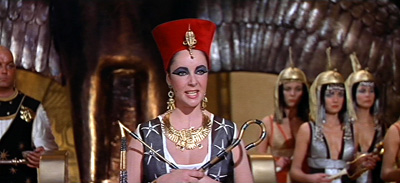
Cleopatra: Without a treaty of alliance with Egypt, you could not hold the territories under your command. True?Oh, he kneels.Antony: Possibly.
Cleopatra: Then Lord Antony, you come before me as a suppliant.
Antony: If you choose to regard me as such.
Cleopatra: I do. You will therefore assume the position of a suppliant before this throne. You will kneel.
Antony: (incredulous) I will what?
Cleopatra: On... your... knees.
Antony: You dare ask the proconsul of the Roman Empire...
Cleopatra: (pissed) I asked it of Julius Caesar. I demand it of you.
Elizabeth Taylor's performance did not earn her an Oscar nomination, as Rex Harrison's did. She was inconsistent and seemed lost with such a big script. Some of this might not be her fault, of course. After she saw the film, Taylor complained that her best work had been edited out when Daryl Zanuck insisted that it be cut down to a manageable four hours.
When the real Cleopatra first met Caesar, after sneaking into his room in a rolled up carpet, she was only nineteen years old. She died at age 39, legend says from a self inflicted asp bite. Yet, Elizabeth Taylor never seems to grow in the film. Her nineteen year old Queen acts the same as her 39 year old Queen. Only the costumes are different.
The most fantastic scene for me was the depiction of the Battle of Actium. Roman history buffs know this was the naval battle off the coast of Greece between the forces of Octavian and the forces of Marc Antony, which ended the Roman Civil War and signaled the end of the Roman Republic. Watching the movie, I knew the ships were all models, but it's such an unfamiliar scene I found it believable.
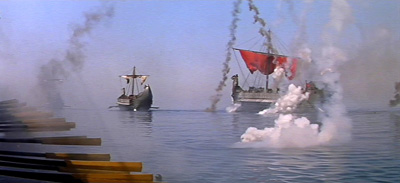
I gave Cleopatra four Netflix stars (really liked it). I did really like it, even while I wished it could have been better. It's just so big, it's an accomplishment getting through the whole thing. And I feel like all the effort they put into such an epic does count for something, although it is ultimately unsatisfying. I suspect that if they ever find and restore all that lost footage, the original six hour version will probably be a lot better.
_______________
* Never mind that the Arch of Titus was built a hundred years after Cleopatra's death.
Posted by: annika at
07:43 PM
| Comments (15)
| Add Comment
Post contains 1310 words, total size 9 kb.
February 24, 2007

The Sandpiper, 1965
This movie is set in the beautiful Central Coast of California, from San Simeon to Big Sur. The restaurant Nepenthe even makes an appearance. You may remember I wrote a poem about Nepenthe. In case you don't remember, this is a good excuse for me to re-post it.
At NepentheThe Nepenthe of 1965 looks pretty much the same as it did the last time I was there, about ten years ago. I see from their website that they've bumped the price of their hamburger up to $13 since then! In The Sandpiper, it was a hippie hangout too, and the scene of some minor fisticuffs between Charles Bronson and Richard Burton.At the edge of a deep
Verdant crevasse
The hissing ocean so far below
Barely seen this morning
Through the fogCool gentle breeze, and
Green strands among blue waves
Of the pacific, sea of forgetfulness
Calming spirit and mind
As you sit waitingPale rays of gold
The sun from your left
Warms your arm and lights
This contented respite
On your journey southSailing through the mist
Wings teetering, acute dihedrals
Vultures float like seraphim
Two hundred feet beneath
Your outdoor table, whereYou eat your nine dollar hamburger
And quaff oÂ’ quaff this diet coke

Elizabeth Taylor plays Laura Reynolds, a free spirited artist/feminist/atheist who's moved to a cozy shack on the beach in order to raise her son far away from the evil influence of traditional values. She doesn't have a high opinion of men, most especially Richard Burton's character Dr. Hewitt, an Episcopal priest.
Taylor's son gets in trouble with the law for shooting a deer, and the judge orders Taylor to send him to the private religious boarding school run by Burton. Single mom and school principal soon clash over child rearing philosophies, as in this scene.
Dr. Hewitt: It may be hard for you to believe Miss Reynolds, but boys like children of their own age. They also like some order in their lives. Given just a little time, Danny will adjust beautifully.Despite the parent/teacher friction, Burton quickly becomes smitten by the new MILF, even though he's a priest, and he's already married to another hottie, Eva Marie Saint. It doesn't take long before Burton abandons his scruples and they fuck while a little broken-winged sandpiper looks on.Laura: Adjust to what?
Dr. Hewitt: To himself, to other people, to society.
Laura: That's just it, I don't want him to adjust to society!
Dr. Hewitt: Well if you want Danny to be a non-conformist, San Simeon is the best place that could happen to him, we'd give him a set of values there that he can rebel against later. Otherwise, he may rebel against yours.
Laura: Oh I see. You mean you teach children evil, so they can rebel against it when they grow and become good.

The Sandpiper is not a particularly good movie. It's really slow and there's some corny "oh God how I want you" dialogue. The best thing about it is the Oscar winning theme song "The Shadow of Your Smile," and of course the scenery. Check out both in these opening credits.
I expected better from director Vincente Minnelli (An American In Paris, Gigi) and writer Dalton Trumbo (Roman Holiday, Spartacus). I gave it three stars on the Netflix scale, "liked it," but just barely.
BUtterfield 8, 1960
I'll tell you right up front, BUtterfield 8 is one of my favorite Elizabeth Taylor movies. Beautifully shot, amazing performances, great characters, and no Richard Burton! Instead we get Laurence Harvey in the best performance of his career. He plays the same self-important prig that you saw in The Manchurian Candidate and The Alamo, only this time with a lot more depth. He's a playboy who married well, but messes around on his wife out of self-loathing and boredom. He treats his women like whores, until meeting Elizabeth Taylor's character, a nympho by the name of Gloria Wandrous. As in The Sandpipers, Elizabeth Taylor gets cast as the "other woman."
Interestingly, Elizabeth Taylor is at the apex of two love triangles in this one. It's more of a love bowtie, I guess. A subplot involves Taylor's best friend, a writer played by Eddie Fisher, her real life husband at the time. Fisher's girlfriend wants to get married, but he's having trouble getting past his barely concealed crush on Elizabeth Taylor, who toys with his affections mercilessly. Again, she's the "other woman," this time preventing a marriage.
But it's the fiery relationship between Taylor and Harvey that provides all the action in this movie. It opens with Elizabeth Taylor waking up alone in Harvey's bed the morning after their first tryst. She wanders around the mansion, and after brushing her teeth with whiskey, finds a thank you note from Harvey with a wad of cash for her trouble. In retaliation, she scrawls her response in the mirror and steals one of his wife's furs.
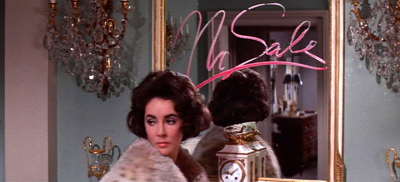
The second time they meet is at a bar. I love the dialogue in this scene because they spar like two champions in a draw match. You wonder, has the playboy finally met his match? Has the man-eater finally met hers? At the climax of the scene, Harvey grabs her wrist in a vice-grip, while she crushes his instep with her heel.
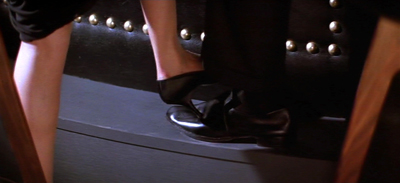
Ouch. They both retire to neutral corners after that, but by the end it's Harvey's character who throws in the towel. Can you blame him? It's Elizabeth Taylor! He's so in love he vows to change his life around for her, leave his wife, and get a real job. Taylor cleans up her act too, and it looks like she's become a one man woman at last. But, and there's always a but, in the end their high hopes all come crashing down. Quite literally.
Elizabeth Taylor won the Best Actress Oscar for this role, and she totally deserved it. (She was up against Shirley Maclaine for The Apartment that year. Wow, I'm glad I wasn't voting.) Remember this was 1960 and frank treatment of sexuality was still pretty daring. There's a scene at the end when Taylor breaks down in front of Eddie Fisher, telling him a dark secret. Even by today's standards, that scene still blows me away. That's all I'll say about it.
Hollywood still makes movies about slutty women, but nowadays it's all about shock value and appealing to the sickest impulses of the criminal mind. It's enough to make me turn into a feminist. "Hey let's chain a naked chick to a radiator for the whole movie?" How disgusting. I'll take the classics and Elizabeth Taylor over Christina Ricci and fetish porn anyday.
I gave BUtterfield 8 four stars on the Netflix scale, "really liked it."
Posted by: annika at
02:24 PM
| Comments (8)
| Add Comment
Post contains 1158 words, total size 8 kb.
February 06, 2007

Taylor and Burton began their affair during the filming of Cleopatra, while they were both married to someone else. Today we'll take a look at their second movie together, released the same year as Cleopatra.
The V.I.P.s, 1963
A movie poster for The V.I.P.s promises:
ELIZABETH TAYLOR... and RICHARD BURTON... in a story about... that exciting chemistry: man and woman! The emotions... are measured... in megatons!The copy is deceptive, because V.I.Ps is really an ensemble film. If you count up all the Academy Awards owned by members of the cast, the total comes to six. Taylor won two, Maggie Smith won two, Margaret Rutherford won one (for The V.I.P.s) and Orson Welles won an honorary Oscar. That's not to mention Richard Burton's seven Oscar nominations (he never won).
Despite its dream-team cast, the movie is not another Ishtar. There are some really good performances, most notably Louis Jourdan's as Elizabeth Taylor's paramour.
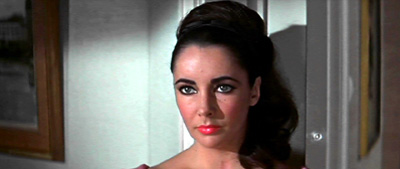
Taylor does what she can with a script that assigned her the least interesting character. Her performance is subtle, and as usual she conveys as much with her eyes and a tilt of the head as she does with her lines. But Jourdan's character is the one we get to know best. It's a love triangle story. Jourdan is the playboy gambler who has stolen Elizabeth Taylor away from her rich husband, Richard Burton. Interestingly, at that time, Burton was in the process of stealing Taylor away from Eddie Fisher.
The other plot lines involve Rod Taylor as a charming but unlucky Australian businessman and Maggie Smith plays his girl Friday, who's secretly in love with him. Orson Welles plays a characature of a film director, who tries various schemes in order to dodge the onerous British tax system. Welles's storyline is intended to be comic relief, but ends up being totally forgettable. Welles was in the middle of his second European exile, and perhaps he needed the money.
Since the movie centers loosely around a transatlantic airline flight, it's fun to see a romanticized version of passenger air service, Fifties style. In the movie, BOAC assigns a special guy just to take care of the first class passengers. When the flight is delayed, they all get luxury suites in the BOAC hotel, and a car to pick them up in the morning. Nice.
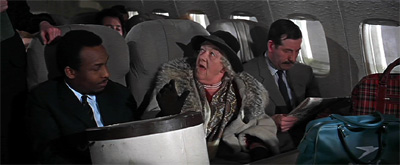
But even back then, there were nasty flight attendants. Here's how Margaret Rutherford as a disheveled, pill popping duchess dealt with one impudent stewardess:
Duchess: Conductress... Conductress!Rutherford's character has some really funny lines, but giving her an Academy Award for that tiny part reminds me of Jack Palance's Oscar.Stewardess: (coolly) Did someone call something?
Duchess: Yes dear, I did. Will you please put this thing in the hold.
Stewardess: In the hold?
Duchess: Well, wherever you do put luggage that isn't wanted on the voyage.
Stewardess: If you had wanted this with your other luggage, you should've thought of that earlier, shouldn't you've?
Duchess: (regally) If that is a question to me personally, yes. If it is a general comment on human behaviour, it is an extremely unoriginal one, and hardly worth making. Kindly dispose of this hatbox.
Stewardess: But I have no room.
Duchess: Well then, you must make room, mustn't you dear.
Maggie Smith, whom I love, and whom you probably know best as Professor McGonagall of Gryffindor House, is wasted in The V.I.P.s. If you want to see how wonderful an actress she is, do rent The Prime of Miss Jean Brodie right away.
I gave The V.I.P.s a 3 out of 5 on the Neflix scale: "liked it." Put it on your movie watching queue only if you're a serious ET/RB fan, which I hope you will be by the end of this film festival. But before I leave you, I want you to look at the chair in this next screencap closely.
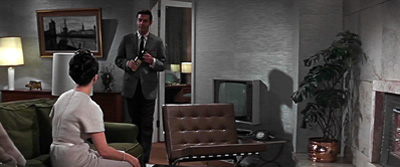
Strawman is probably the only one who may recognize it as a Poul Kjærholm design (at least a knockoff). When I was in Denmark last summer, I had the pleasure of seeing a Kjærholm exhibit at the Louisiana museum on the east coast of Sjælland. I totally want that chair.
Posted by: annika at
11:23 PM
| Comments (7)
| Add Comment
Post contains 752 words, total size 5 kb.
January 28, 2007
I racked my brain to figure out whom to honor during this year's festival. It's quite an investment of my time: ordering the movies on Netflix, setting up my archaic screen capture procedure (don't ask, it involves lots of cable, 3½ inch floppies, my early '90's crappy laptop, and lots of running back and forth), finding and editing the pictures and then figuring out what to say about each movie.
Under consideration were fellow blonde favorites Steve McQueen and Ryan O'Neal. However, since the Oscars inspired this whole boondoggle in the first place, I decided that I should limit my choices to Oscar winners. I also wanted to pick someone whom I'm not that familiar with, because I really had a lot of fun discovering new movies during last year's Goldie Hawn event.
I reviewed eight movies last year, and so I've picked eight again for this year. That's two a week, if I want to get it done before the Oscars on February 25th; a tall order so if any of you want to help me out, let me know.
And this year's Second Annual Annika's Journal Film Festival honoree is: Elizabeth Taylor, the Sixties movies.
Posted by: annika at
11:44 AM
| Comments (5)
| Add Comment
Post contains 269 words, total size 2 kb.
December 22, 2006

Here's a quick movie recommendation: Little Miss Sunshine. I gave it four stars. The cast is fantastic (it's exhibit A for why the Academy should have a special Oscar for casting), especially Greg Kinnear, Steve Carell, Alan Arkin. The girl who plays Olive is wonderful. And Chloe from 24 has a small part in it.
It's black comedy with a nice message at the end. Go rent it.
Posted by: annika at
11:52 PM
| Comments (9)
| Add Comment
Post contains 72 words, total size 1 kb.
June 24, 2006
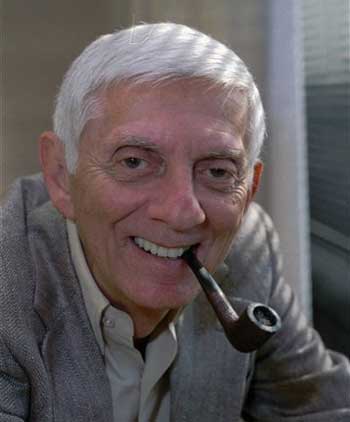
Spelling, a onetime movie bit player who created a massive number of hit series, from the vintage "Charlie's Angels" and "Dynasty" to "Beverly Hills 90210" and "Melrose Place," died Friday, his publicist said. He was 83.Rest in peace, and thank you friend.Spelling died at his home in Los Angeles after suffering a stroke on June 18, according to publicist Kevin Sasaki.
Spelling's other hit series included "Love Boat," "Fantasy Island," "Burke's Law," "The Mod Squad," "Starsky and Hutch," "T.J. Hooker," "Matt Houston," "Hart to Hart" and "Hotel." He kept his hand in 21st-century TV with series including "7th Heaven" and "Summerland."
. . .
During the 1970s and 1980s, Spelling provided series and movies exclusively for ABC and is credited for the network's rise to major status. Jokesters referred to it as "The Aaron Broadcasting Company."
Success was not without its thorns. TV critics denounced Spelling for fostering fluff and nighttime soap operas. He called his shows "mind candy"; critics referred to them as "mindless candy."
"The knocks by the critics bother you," he admitted in a 1986 interview with The Associated Press.
"But you have a choice of proving yourself to 300 critics or 30 million fans. You have to make a choice. I think you're also categorized by the critics. If you do something good they almost don't want to like it."
. . .
Spelling had arrived in Hollywood virtually penniless in the early 1950s. By the 1980s, Forbes magazine estimated his wealth at $300 million. He enjoyed his status, working in a Hollywood office larger than those of golden-era moguls ("I'm slightly claustrophpobic," he explained.) He gifted his second wife, Candy, with a 40-carat diamond ring.
. . .
Spelling grew up in a small frame house on Browder Street in Dallas "on the wrong side of the tracks," he wrote in his 1996 autobiography. He was the fourth son of immigrant Jews, his father from Poland, mother from Russia. The father's name, Spurling, was simplified to Spelling by an Ellis Island official.
Spelling enlisted in the Army Air Corps after graduating from high school in 1942.
"I grew up thinking 'Jew boy' was one word," the producer wrote in his memoir, "Aaron Spelling: A Prime-Time Life." He was considered strange by his Dallas schoolmates because his parents spoke Yiddish. He was subjected to anti-Semitic taunts and beatings on his way home from school.
At 8, the boy suffered what he termed a nervous breakdown, and he spent a year in bed. He later considered that period the birth of his creative urge. He fell in love with great storytellers, especially O. Henry. Of his early TV series he said, "They are all O. Henry short stories."
Posted by: annika at
11:33 AM
| Comments (2)
| Add Comment
Post contains 482 words, total size 3 kb.
June 21, 2006

In the closest voting ever, La Femme Nikita has beaten Beatrix Kiddo to advance to the final round.

Her opponent: Jason Bourne. Let the final round begin.
Previous updates can be found here, here, and here.
Posted by: annika at
09:17 PM
| Comments (2)
| Add Comment
Post contains 52 words, total size 1 kb.
June 17, 2006
The moviemakers don't need my advice, but in case any are reading here it is: Jack meets Jason!
Think about it.
Posted by: annika at
10:40 AM
| Comments (2)
| Add Comment
Post contains 91 words, total size 1 kb.
April 07, 2006
Who knew there were so many Leon fans out there? And I thought The Professional was a heartwarming tale about some French dude and his kid. Maybe I should see it again.
Anyways, Jason Bourne advances and the bracket looks like this:

The next matchup is between Nikita of La Femme Nikita and Beatrix Kiddo of Kill Bill Parts 1 and 2. The question, as always, is this: "If Nikita and Beatrix Kiddo were each given orders to kill each other, who would win?"
So what are you waiting for? Scroll down and vote!
Previous updates in this, the blogging equivalent of a massive public works project,* can be found here, and here.
_______________
* Nobody's sure if it's worth the effort, but we've gone too far to call off the damn thing now.
Posted by: annika at
05:36 PM
| Comments (8)
| Add Comment
Post contains 212 words, total size 2 kb.
March 28, 2006
Posted by: annika at
12:20 AM
| Comments (3)
| Add Comment
Post contains 23 words, total size 1 kb.
March 27, 2006

The One And Only, Genuine, Original Family Band, 1968
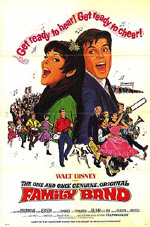 This was a pleasant surprise. I really liked this movie, though I didn't think I would. The concept couldn't sound more boring, even to a history buff like myself. It's set during the contentious presidential election of 1888, between Democratic incumbent Grover Cleveland and Republican challenger Benjamin Harrison. Not exactly a formula for box office bonanzae, even back in 1968. I'd hate to have been the one pitching this one to Disney:
This was a pleasant surprise. I really liked this movie, though I didn't think I would. The concept couldn't sound more boring, even to a history buff like myself. It's set during the contentious presidential election of 1888, between Democratic incumbent Grover Cleveland and Republican challenger Benjamin Harrison. Not exactly a formula for box office bonanzae, even back in 1968. I'd hate to have been the one pitching this one to Disney:
Mr. Disney: Hmm. I don't know. Who did you have in mind to play the lead?Originally intended as a two part tv movie, TOAOGOFB was based on the exploits of some real life historical figures, the Bower family of South Dakota.Pitcher: Well, John Davidson's available, and Walt Brennan's signed on.
Mr. Disney: Uhhh. Who else?
Pitcher: And Buddy Ebsen.
Mr. Disney: Errr. The Beverly Hillbillies guy? Is that all? I don't know.
Pitcher: Oh... and uh, I think we can get Kurt Russell.
Mr. Disney: Russell? Why the hell didn't you say so?! That kid's gold! When can you start production?
The Bowers became quite popular in the area because they had they own family band. . . . At the time, there was only one brass band west of the Missouri River, the military band attached to the Seventh Regiment, then stationed in Fort Meade. The military band was scheduled to perform at [a] celebration. Calvin [Bower] went to extreme measures and was successful to persuade the committee to also book his Family Band to play for the occasion.In the movie, the fictional Bowers are divided along party lines with Grandpa (Walt Brennan, who else?) a cantankerous Democrat, and his son (Buddy Ebsen) a quiet Republican. Brennan's granddaughter gets involved with a dashing Republican newspaperman (John Davidson). He convinces the whole family to move to the Dakota territory, hoping they'll add to the solid Republican majority.. . . When the chairman called for music, the leader of the Fort Meade Band responded. After the speaker spoke, the chairman hardly rose when the Bower Band began to play without permission. The Bowers took the crowd by surprise and there was much clapping and shouting. It took the breath right out of the Fort Meade band and they folded up their music racks and left the platform. This was the introduction of the Family Band to the Black Hills.
Davidson and the local Republicans are working to get Dakota admitted to the Union as two separate states, in order to shift the balance of power in congress with the addition of four Republican senators.* Davidson gets a shock when he finds Walt Brennan in the schoolhouse, doing a sort of 19th Century Jay Bennish act for the kids.
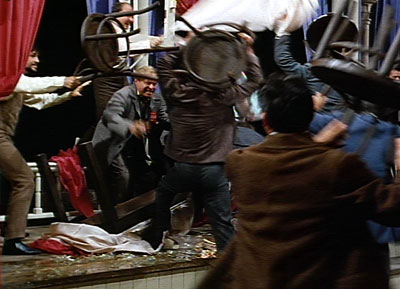
The eerie topicality of TOAOGOFB is one of the delights of this movie. The musical numbers are horribly bad** (with the notable exception of the finale, which is Goldie's only scene), but I laughed out loud at the unexpected parallels between 1888 politics and today.
Besides the issue of overtly political schoolteachers, the movie touches on political demagoguery, freedom of speech and dissent, and even stolen elections. As you all should know (I'm not ruining anything for you) Benjamin Harrison won the 1888 election despite losing the popular vote by over 90,000. During the movie's election night party scene, the Democrats' elation turns to violence when they find out that their man lost after the electoral votes were tallied. A riot starts and the meeting hall gets trashed. It only stops when the One and Only, Genuine, Original Family Band plays "My Country 'Tis Of Thee" to calm the crowd down.
After the brawl, Buddy Ebsen gets up to address the partisans with words that are appropriate whether the date be 1888, 1968 or even 2006:
All of us here together can build the greatest united country in the whole bloomin' world if we'll just remember one thing. There's a time to stand up and fight for what you believe in, and there is a time to join hands and work together, or all the fighting doesn't mean a thing.The teenaged Kurt Russell made the most of his small part. Despite the fact that he hated dancing, Kurt acquited himself well during the musical numbers. Goldie's one-line part featured some pretty good dancing, as well as her trademark smile. The big scene involves a sort of dance-duel between Lesley Ann Warren and John Davidson as they try to make each other jealous by do-si-do-ing with other partners. Goldie is Davidson's "other partner."
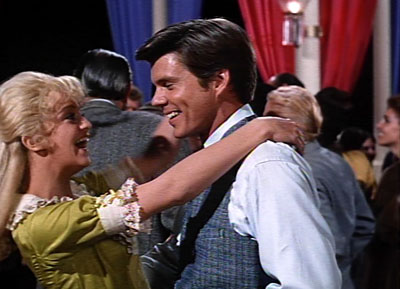
There are no scenes between Goldie and Kurt; and their off screen romance developed many years later. Goldie's memoir, A Lotus Grows In The Mud, includes the story of how she met Kurt the second time, during the casting of 1984's Swing Shift. Goldie apparently didn't even recognize Kurt, and although he remembered Goldie, Kurt had a big crush on Lesley Ann Warren at the time. Funny how the two of them were in the same movie without realizing that they were soulmates until sixteen years later!
I totally recommend TOAOGOFB, but only if you are prepared for the odd combination of Gilded Age politics and good old fashioned Disney schmaltz. I give it 3½ stars.
_______________
* As you all know, in 1888, Senators were elected by the state legislatures.
** I can't emphasize enough how bad the songs are. The libretto includes a rousing tribute to Grover Cleveland, "Let's Put It Over With Grover," (don't rock the boat/ give him your vote...) and a similarly pukeworthy paean to Benjamin Harrison, titled simply "Oh Benjamin Harrison," (he's far beyond comparison...). However, the final dance number, "West O' The Wide Missouri," is well choreographed and the song is pretty catchy. Also, 60 year old Buddy Ebsen showed he could still do a nice soft shoe routine.
Posted by: annika at
09:29 AM
| Comments (3)
| Add Comment
Post contains 1015 words, total size 7 kb.
March 18, 2006

The Duchess and the Dirtwater Fox, 1976
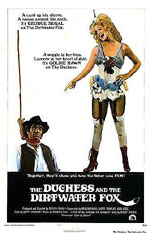 Starring Goldie Hawn and George Segal (whom I loved in one of the meanest movies ever, the classic Who's Afraid Of Virginia Woolf?).
Starring Goldie Hawn and George Segal (whom I loved in one of the meanest movies ever, the classic Who's Afraid Of Virginia Woolf?).
The interesting thing about Duchess is how different Goldie's character is from her more timid roles of the early seventies. It seems that her roles had gradually become more assertive with each film, and this one went way off the scale.
The movie opens with Goldie and another chick rolling on the floor in a full-on bitch fight. She talks like a sailor, punches people out, handles a Winchester like a pro, and even flips the middle finger in one scene. A recurrent motif in the film are a couple of embroidered pasties that keep falling out of Goldie's purse at inopportune moments.
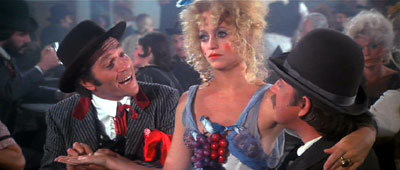
Goldie plays a hooker/cabaret dancer in 19th century San Francisco, who's always on the make. Segal plays a small time crook/gambler who's also always on the make. A bag of stolen money brings them together, and as I like to say, hijinx ensue.
At first Goldie doesn't like Segal, who's all hands when they first meet. But then she finds out about the money and plays along until she can steal it from him. He chases her, and a gang of outlaws chases him. Somehow or another Goldie gets mixed up with a band of Mormons on their way to Salt Lake City, including the great Conrad Janis. (I think there's the obligatory shot of a stagecoach going over a cliff, which must be stock footage because I've seen it in so many westerns it's not even funny.)
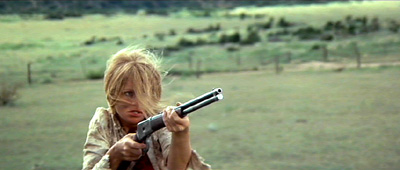
The comedy is pretty hit or miss, but the funniest scene takes place inside the stagecoach between Goldie and Segal. They're trying to concoct a scheme without Conrad Janis, who's sitting between them, figuring out what they're saying. So they speak in a comical pidgin German that's really well done.
The rest of the movie is kind of juvenile and the situations seem contrived. Goldie realizes she loves the gambler in the middle of a chase scene, while they're pretending to be guests at a jewish wedding. Later, they have sex in a rowboat, before going through the rapids. The bad guys eventually catch up with our heroes and tie them to stakes in the desert.
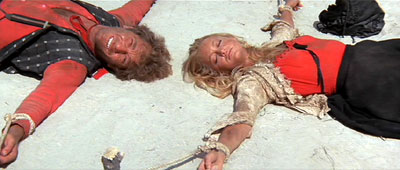
Finally, everything works out for the best, but I forgot if they get to keep the money or not. Costume-wise, the movie is heavy on red and black. The costume designer must have been a big Stendhal fan, I guess. One highlight of the movie is when Goldie sings a bawdy song called "Please Don't Touch Me Plums" with a bunch of kids, Julie Andrews style. Fans of Bobby Vinton should also like the sappy theme song, "Lemon Drops, Lollipops And Sunbeams."
Consider me not one of Bobby Vinton's fans. Nor am I a big fan of The Duchess and the Dirtwater Fox, which I gave two stars on the Neflix scale. Goldie's performance was a standout (she was nominated for a Golden Globe). But the chuckles in this screwball comedy were too few and far between, and couldn't overcome the generally mediocre script.
Foul Play, 1978
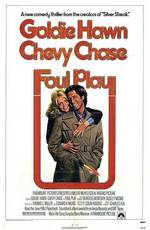 This is the first of Goldie's two romantic comedies with co-star Chevy Chase. It's also an homage to the Hitchcock thriller The Man Who Knew Too Much, which is one of my favorites.
This is the first of Goldie's two romantic comedies with co-star Chevy Chase. It's also an homage to the Hitchcock thriller The Man Who Knew Too Much, which is one of my favorites.
Despite his work in the classics Caddyshack, Vacation and Fletch, I've never really warmed up to Chevy Chase. I'm not quite sure why. In Foul Play, he's a San Francisco detective who protects Goldie Hawn from a gang of assassins out to kill the pope. I suppose people thought Chevy was sexy in those days, but he does nothing for me. Still, the romantic scenes between him and Goldie happen to be the most convincing of any movie she'd done so far.
Goldie's part was a complete 180° from her character in Duchess. In Foul Play, Goldie is a 30-something divorcee who's cute but dissillusioned by the dating scene and looking down the barrel of spinsterhood. She actually reminds me a lot of Meg Ryan's character in When Harry Met Sally, even down to the oversized 80's glasses.
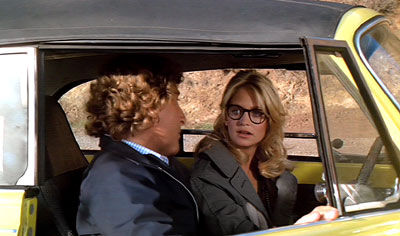
There's not much to Goldie's character; she's kind of an everywoman who's only purpose is to hold the silly plot together. I can't help but like this movie though, despite it's myriad flaws. It's the supporting cast that makes Foul Play as enjoyable as it is. Look who else is in it: Brian Dennehy, Burgess Meredith, Billy Barty and Dudley Moore. (All are dead now, by the way. And don't tell me Brian Dennehy is still alive. You and I both know that Brian Dennehy and Brian Keith are/were the same person.)
Two scenes are absolutely worth the price of the rental. The first is the legendary American debut of Dudley Moore, which is the one scene everybody probably remembers most. While Goldie is trying to hide from a villain known only as "the albino," she asks Dudley Moore to take her back to his place. He misunderstands, thinking he's going to get lucky. It's rotfl funny, with Dudley's valentines day boxers, and the disco ball, and the helium filled blow-up dolls, and the murphy bed with its little trumpet fanfare. That one scene propelled Dudley Moore to stardom, and the next year he did 10 with Bo Derek.
Here's an interesting bit of Dudley Moore/George Segal trivia, which I got from IMDb.
[Dudley Moore was] the first choice to play Henry Fine in "The Mirror Has Two Faces," only to be replaced by George Segal (who was, ironically, replaced by Moore in the role of George Webber in "10"). In an interview following his announcement that he had supranuclear palsy, he revealed that he was dismissed from the role because he had trouble remembering his lines.The second most memorable scene in Foul Play is when Burgess Meredith kicks the villainess's ass in a kung-fu fight. That's pretty much all I need to say about that crazy scene.
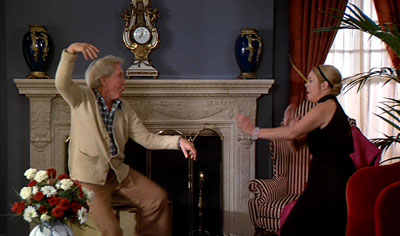
I did run into a little suspension of disbelief issue when Chevy and Goldie were racing through San Francisco trying to get to the Opera House in time to foil the assassination plot. They seemed to be driving through all the wrong neighborhoods. Maybe I know the City too well, but I was like: "Dude, it ain't that hard. Just take Gough, you'll get there in five minutes."
The costumes weren't all that hot. Goldie wears a lot of nondescript solid color sweaters. She ends the movie in a disco era powder blue décolleté that I don't like at all. The music however, was a strong point for me. Barry Manilow sings the Oscar nominated theme song and, as you know, I love Barry. Plus, Gilbert and Sullivan's The Mikado is featured throughout.
I'm giving Foul Play three Netflix stars. It made me laugh a lot more than it had a right to. But the characters are lovable, and it definitely succeeds as fun and light entertainment.
Previous installments in the 1st Annual Annika's Journal Film Festival can be found here. I have three more to go. Next up, Seems Like Old Times.
Update: Congratulations to Goldie Hawn, who recieved the American Film Institute's Star Award in Aspen last Saturday. She's still hot.
Posted by: annika at
11:14 PM
| Comments (9)
| Add Comment
Post contains 1265 words, total size 9 kb.
March 09, 2006

Shampoo, 1975
Yes, the biggie, the classic. There's a lot to say about Shampoo, and a lot of good stuff has been written already.
In my view, this was a transitional movie in Goldie Hawn's career. She was thirty when the film came out. As Warren Beatty's girlfriend Jill, you still see the cute vulnerable waif from her previous comedies, but you also see flashes of the more assertive Goldie Hawn characters of the eighties and nineties. There's even a hint of that whininess she later honed to perfection in Bird On A Wire, Overboard and Private Benjamin.
Make no mistake, Shampoo is a Warren Beatty - Julie Christie vehicle, and Goldie is a supporting player.* But she had definitely arrived by 1975, and being cast in this film was merely proof of the fact.
Shampoo is another bedroom farce, but a vastly different one from Cactus Flower. Although set in 1968 (election day to be exact), Shampoo is a movie of the Seventies, or more accurately, that part of the Seventies which inspired the phrase "The Me Decade." Instead of slamming doors, each peccadillo is punctuated by a shot of Beatty tearing across Beverly Hills on his little Triumph 500.
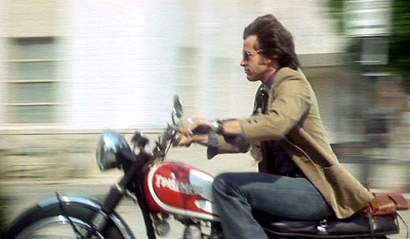
Shampoo is about fucking. As much as each character can get away with. It's a very pre-aids movie. For a script that took eight years to write ― and the writing process was contentious at times ― there's not much of a plot. In a sense it's very much like a Dazed And Confused for the over 30 set. All the action takes place within about a 48 hour period. Beatty plays a vacant hairdresser juggling at least three women at the same time. Goldie is his easily manipulated girlfriend. Julie Christie plays an old flame who's also Goldie's best friend. And Lee Grant plays a client who's giving him a little something something on the side. Grant won an Academy Award for the role.
I must confess I didn't like Shampoo at first, mainly because I'm not a big fan of Warren Beatty. I hated Bullworth and Dick Tracy. And I was ambivalent about Bugsy, although I thought Splendor In The Grass and Reds were fantastic. But Shampoo has grown on me with each viewing. What it lacks in plot, it makes up in great lines. Like these:
GEORGE: Ever listen to women talk? I do till it's running out my ears. They only talk about one thing, How some guy fucked them over. That's all that's on their minds.Lol. I hate to say it, but that's true in many cases. Not mine of course.
Here's some more classic dialogue. Lorna is the teenage daughter of one of the women Beatty's character is banging. She's played by Carrie Fisher in her first feature film role. I love this banter.
LORNA: Are you gay?... baked apple?... they're cold but they're good.They end up screwing, of course.GEORGE: No thanks.
LORNA: Did you hear me?
GEORGE: Yeah.
LORNA: Well, are you? Are you queer?
GEORGE: yeah.
LORNA: (laughing) C'mon, are you or aren't you?
GEORGE: Gee, this is great.
He slices a piece of cheesecake. Lorna sits down, in the
chair nearest him now.LORNA: C'mon, tell me. Don't be afraid.
GEORGE: Why do you wanna know so bad?
LORNA: See if you've been making it with my mother.
GEORGE: What would my being a faggot have to do with that?
LORNA: (shrugs) Nothing, I guess... have you ever made it with a guy?
GEORGE: Have you ever made it with a girl?
LORNA: I asked you first.
GEORGE: Yeah... I've made it with a girl...
Lorna smiles. A pause.
LORNA: Well, are you?
GEORGE: Am I what?
LORNA: Making it with my mother?
There's two or three scenes with Goldie that blew me away. The first that comes to mind is a short scene when Goldie is walking home from an audition, and stops at a fruit stand. It shows the actress's maturation from a comedienne who delivers lines with great timing, to an actress who can show her inner dialogue without speaking a line.
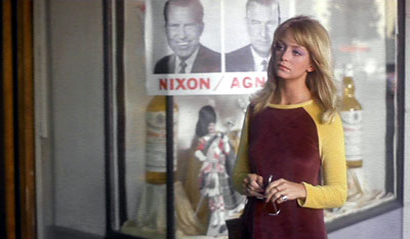
You know she's obsessing over her fight with George, and whether or not to take that acting job, and you can see it all in her face, along with her character's indecisiveness and insecurity. Then she picks up an apple, and for just a moment, you watch her agonize over whether to buy the apple or not until she finally tosses it back in the bin. It's really hilarious.
The shot below is from another scene I love. It shows Goldie just after she got out of a porsche at the election night party, and her boyfriend Beatty is there escorting her best friend into the restaurant. Goldie shoots him a look that is pure daggers. And Beatty has this look like, "oh shit, this is going to be a long night." And it was.
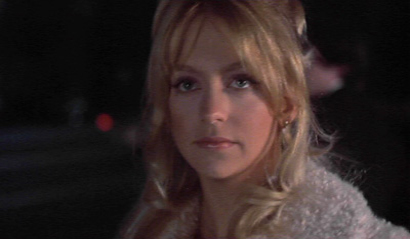
By the way, the silver dress she wore for that election night party was simply adorable, and about as short as legally possible.
There's another great scene at a psychedelic party on a large Beverly Hills estate. Jack Warden's character and Goldie's happen to bust in on Warren Beatty and Julie Christie while they're fucking in the poolhouse. Julie Christie plays Warden's mistress, and Goldie's best friend, so you can imagine both of them are horrified at this discovery. But their reactions are the exact opposite of what you'd expect. It's a terrific scene.
My rating was three stars (liked it), definitely worth a rental. Next up on the AJFF: The Duchess and the Dirtwater Fox.
_______________
* Goldie also starred opposite Warren Beatty in 1971's Dollars. Unfortunately, that film is not yet on DVD, and therefore Netflix doesn't carry it.
Posted by: annika at
12:53 AM
| Comments (8)
| Add Comment
Post contains 976 words, total size 7 kb.
March 04, 2006

Butterflies Are Free, 1972
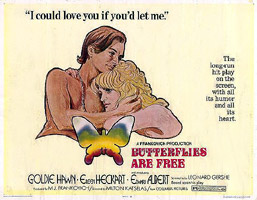 In Butterflies, Goldie plays yet another young waif with more modern sexual mores. Like her first two films, this one is also based on a stage play. The screenplay was written by the original playwright, which is probably the reason why it's so chatty and the action takes place almost completely inside an apartment. Writing for the screen and writing for the stage are two different animals, a fact that is often lost on theater people.
In Butterflies, Goldie plays yet another young waif with more modern sexual mores. Like her first two films, this one is also based on a stage play. The screenplay was written by the original playwright, which is probably the reason why it's so chatty and the action takes place almost completely inside an apartment. Writing for the screen and writing for the stage are two different animals, a fact that is often lost on theater people.
Butterflies is about a blind guy who is trying to gain some independence from his overprotective mother and make it on his own. It's the kind of simple PC message movie that Hollywood made a lot more of in those days: "Blind people are people too." Goldie plays the free-spirited next door neighbor who is afraid of commitment. The conflict arises when Goldie meets the mother (played by veteran TV actress Eileen Heckart, who won a Best Supporting Actress Oscar for this role).
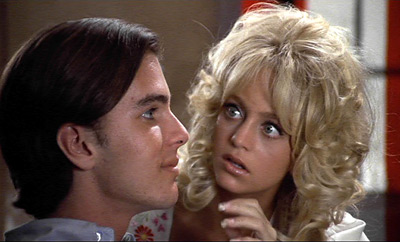
Goldie again demonstrates a surprising dramatic ability in addition to her already established comic talent. As usual, she lights up the screen. Blocking was important in this movie because of the limitations of the apartment set. But Goldie seems to glide effortlessly from couch to floor to kitchen to table to bed. She handles the emotional transitions with the same ease. The drama seems to slow down in the middle of the movie, but things pick up at the end with the addition of Paul Michael Glaser (pre-Starsky, of course) in a bit role as a sleazy director of experimental (i.e. nude) plays.
The blind dude is played by Edward Albert, the son of Green Acres' Eddie Albert. He's an interesting guy. Half Colombian, educated at Oxford, he has an IQ of 157 according to IMDb, and he speaks Spanish, French, Portugese and Mandarin. Unfortunately, I found his constant wisecracking throughout Butterflies to be a distraction. He delivers his sarcastic lines with a deadpan affect that is too annoying for my taste. The mom character is just as sarcastic, but much more appealing.
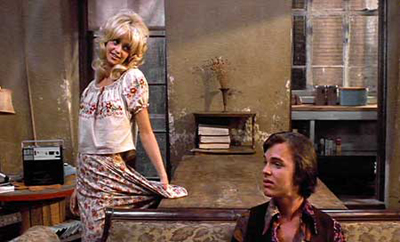
As is my wont, I paid special attention to the costuming. Goldie had three outfits in this film. In the first act, she wore a cute peasant blouse and flirty ankle length skirt, which was her best look. She spends the middle third of the movie in a bra and panties only. I thought Goldie looked a little thick in There's A Girl In My Soup, but I must say, she was in awesome shape for Butterflies. Finally, during the third act she wore a dreary green floral dress, which was nothing to write home about.
As for ratings, I gave Butterflies three stars (liked it). The final act, with it's romantic suspense, saved the movie for me. Yes, I had a few tears. But I cry at the drop of a hat with these kinds of movies. In the end, all three main characters learn something from each other. Personal growth is always a good thing in a romantic comedy, if not in life.
The Sugarland Express, 1974
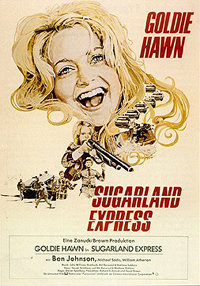 If Butterflies Are Free sounds like too much of a chick-flick for you, definitely check out The Sugarland Express. Not only was it Goldie Hawn's best role to date, it was Steven Spielberg's debut as a feature film director. And what a debut!
If Butterflies Are Free sounds like too much of a chick-flick for you, definitely check out The Sugarland Express. Not only was it Goldie Hawn's best role to date, it was Steven Spielberg's debut as a feature film director. And what a debut!
Long time visitors may have guessed that I'm a scholar of the 70's action movie. I mean I'm really a scholar; I wrote a paper on them in undergrad, when I toyed with the idea of being a film studies major. However, I can't claim to have been much of a scholar if I hadn't seen Sugarland Express up 'til now. I was truly missing out.
Sugarland was Universal's attempt to cash in on the anti-hero chase movie craze of the early 70's. Like another favorite of mine, Dirty Mary Crazy Larry, the main character is a skinny blonde who's as dumb as she is cute. But in Sugarland, the anti-heroes are more loveable than usual. You don't have to sympathize with them in spite of their badness, because they aren't really all that bad.
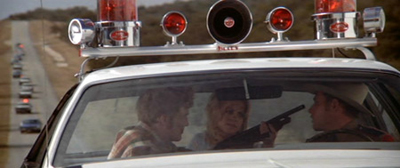
Goldie plays the wife of a small time crook who has just four months left on his sentence for petty crimes. Their kid just got taken away from her and given to a foster home. Goldie breaks her man out of jail and they take off on a comic journey across southeastern Texas to get thier little boy back. Along for the ride is a kidnapped Texas highway patrolman with a slight case of Stockholm syndrome.
The name Sugarland Express is meant to be ironic, because the pursuit is anything but an express. It's more like a 1970s version of OJ's "slow speed chase," complete with cheering throngs of roadside fans. Goldie's character insists on stopping to pee, or to get some fried chicken, or to pick up some trading stamps.
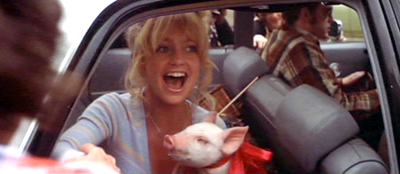
From the first reel on, you can tell that this is not your ordinary Goldie Hawn vehicle. She puts on a pretty convincing Texas drawl (to my Californian ears at least). And her character is grittier than the previous three hippie-chick roles she played. Consequently, It just might be her best performance. She still shows off her comic skills, but thanks to Spielberg's direction and the Barwood/Robbins script (Corvette Summer, Close Encounters) we get to see much more of her considerable dramatic range. With Sugarland, Goldie Hawn gave notice that she was indeed a star.
Goldie's husband is played by William Atherton, better known to me as the slimy reporter from Die Hard, and the meddling EPA dude from Ghostbusters. He does a nice job in Sugarland and it's a shame he became so typecast in his later work.
Although Spielberg had already made Duel as a made-for-TV film in 1971, he really showed the maturity of his talent in Sugarland. It's no wonder that Universal let him do Jaws the very next year. Their faith in the 29 year old director paid off. Say what you want about Munich ― I'm disappointed in that choice too ― but the guy has always known how to put together a great movie. To say that Sugarland Express is underrated is to underrate the word underrated. I gave it five stars (loved it), and I think you'd enjoy it too.
Posted by: annika at
09:42 AM
| Comments (3)
| Add Comment
Post contains 1107 words, total size 8 kb.
February 28, 2006

There's A Girl In My Soup, 1970
Girl starred the late, great comic genius Peter Sellers, and Goldie's name appeared above the title for the first time. This import was directed by Roy Boulting, a veteran of largely forgettable British movies. Coincidentally, he and Goldie had the same birthday.
 On the surface, There's A Girl In My Soup shares essentially the same plot as Cactus Flower. Both are May-December romance / love-triangle comedies based on stage plays. Interestingly, Roy Boulting was involved in a real life May-December romance for eleven years with former child star Haley Mills (The Parent Trap, That Darn Cat!). She was 33 years younger than him.
On the surface, There's A Girl In My Soup shares essentially the same plot as Cactus Flower. Both are May-December romance / love-triangle comedies based on stage plays. Interestingly, Roy Boulting was involved in a real life May-December romance for eleven years with former child star Haley Mills (The Parent Trap, That Darn Cat!). She was 33 years younger than him.
In Girl, Goldie plays a 19 year old American hippie chick, living in London with a skeevy drummer. She gets tired of being passed around among the drummer's friends like a tray of tea cakes, so she decides to move out after a chance meeting with a 41 year old tv personality, played by Sellers. The tv personality is a self-absorbed and aging Alfie-like swinger, coming to grips with the handfuls of hair he's beginning to find in his brush every morning.
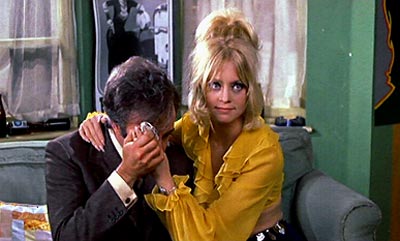
While the movie starts out prominsingly, Goldie's performance was ultimately inconsistent, a sign of weak directing. There is no chemistry between her and Sellers, who mails in the most colorless performance I've seen from him. None of the comic improvisation he was known for is on display here. I think the character was too constricting for him. Here's what Goldie told Larry King about working with Sellers:
HAWN: Peter Sellers was great to work with. A lovely man. A little bit crazy . . . It was sort of balancing a very delicate spirit on a needle. You know, because you never know where he was going.Costume-wise, Girl is nothing special either. The only stand-out is an avocado colored, wide-wale corduroy bikini that Goldie wears while lying on an inflatable raft. One wonders how they got her on that thing without wetting the fabric. Peter Sellers spent a fair amount of time shirtless, which was a major error by the filmmakers. His back was hideously hairy.But I gave him a birthday party once, and he said to me, you know, Goldie, I'll never have a home like this. I'll never have a house like this, and I would like a piece of me in your home. And he sent me a French armoire, and I still have it. That was after he ate his birthday candle, which is a whole other problem.
KING: Was he a genius?
HAWN: Yes, he was. He definitely was. He was completely in his moment, in his truth, at all times there was never a break. He was able to witness how funny he was, and yet not have any control over his ability to -- inability to stop laughing at himself.
We would have to break for lunch sometimes, because we couldn't bring him back. But, you know, you couldn't get a knife in between who he was playing and his comedy and his truth. It was all there together, which is what made him a genius.
Predictably, after a whirlwind tour of the continent, the mis-matched lovers return to London, and reality. The movie ends the same way as Cactus Flower, but in a wholly unsatisfying way. For that reason, I give it two Netflix stars ("didn't like it").
Posted by: annika at
06:14 PM
| No Comments
| Add Comment
Post contains 601 words, total size 4 kb.
February 26, 2006

Why Goldie Hawn? Because she's awesome. How many of you realize that Goldie Hawn won an Academy Award for her very first picture? That's a fact. Also, people always tell me I remind them of a young Goldie, which was probably more true when I was 20, but is still a nice compliment.
When you think that Goldie stumbled into acting (she started out wanting to be a dancer), her comic genius is even more impressive. I rank her talent as a comedienne on the same level as Marilyn's. In fact, I think Goldie took the next step in the evolution of the female comedienne. She played the ditzy character as well as Marylin, but embodied a new beauty ideal that was born in the sixties: the waif look.
But where Marylin played the dumb blonde so straight that people still think she was dumb in real life, Goldie always played it with a subtle wink. You get that same wink today from comediennes like Heather Graham and Cameron Diaz. They're too hip to be dumb. Thank Goldie for that.
Cactus Flower, 1969
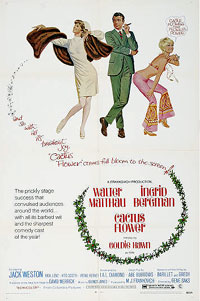 I just got done seeing this one again. I love this movie. The opening credits promise a lot: directed by Gene Saks (The Odd Couple, Barefoot In The Park), starring Walter Matthau and Ingrid Bergman, screenplay by I.A.L. Diamond (Some Like It Hot, The Apartment), music by Quincy Jones, and Sarah Vaughan singing the theme song. Wow.
I just got done seeing this one again. I love this movie. The opening credits promise a lot: directed by Gene Saks (The Odd Couple, Barefoot In The Park), starring Walter Matthau and Ingrid Bergman, screenplay by I.A.L. Diamond (Some Like It Hot, The Apartment), music by Quincy Jones, and Sarah Vaughan singing the theme song. Wow.
The plot reminds me of a Three's Company episode. It's a bedroom farce, and like all great bedroom farce, begins with a lie. Walter Matthau plays a dentist enjoying the bachelor life. In order to "keep things honest" he lies to his girlfriend, played by Goldie. He tells her he is married so he won't have to commit. But then, in a moment of weakness Matthau promises Goldie he'll divorce his wife and marry her. Hijinx ensue when big-hearted Goldie insists on meeting his wife to make sure she won't be hurt by the divorce. Now Matthau needs a pretend wife, and he picks his dental assistant, played by Ingrid Bergman in the title role. Bergman is a frumpy old maid who, like a cactus, occasionally produces a pretty blossom.
Goldie Hawn's performance is a revelation, as they say. This is the one that got her the Best Actress in a Supporting Role Oscar. When she's onscreen, I'm afraid to look at anything else in case I miss one of her facial expressions or funny vocal inflections. There's a scene in which she teaches Ingrid Bergman's character to dance, which is hilarious and embarrassing at the same time.
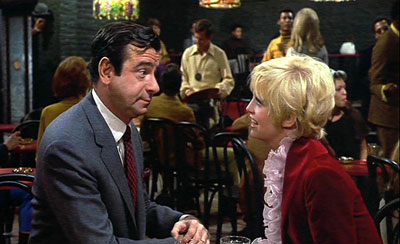
Walter Matthau is an unlikely romantic lead, but if you remember The Odd Couple and even Charley Varrick, he always seems able to pull the chicks. And there is a sweet onscreen chemistry between him and Goldie. You just have to suspend your disbelief a little bit.
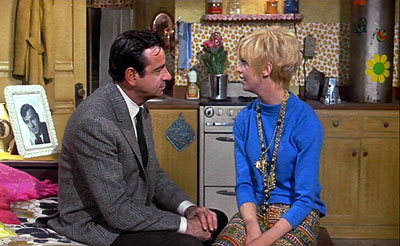
I love Goldie's outfits too. The burgundy velvet suit is very mod. She also wore a nice rust suede miniskirt and boots combo with a yellow turtleneck. And my favorite is pictured above: blue mock turtle, extra love beads, batik inspired capris, and mary janes. Extremely cute.
My rating (using the netflix 5-star system) is five stars. A very witty, sweet and enjoyable romantic comedy with that innocent sixties hipness that you can't find in Hollywood anymore.
_______________
* When I say her "cute years" I don't mean to imply that Goldie ever stopped being hot. Did you see her on Larry King recently? I hope I look that good at 60. She looks 40.
Posted by: annika at
12:43 PM
| Comments (8)
| Add Comment
Post contains 655 words, total size 5 kb.
While a lot of people swear that The Incredible Mr. Limpet is the best Don Knotts movie, i think people who think that are all wet. Knotts excelled at the physical comedy of facial expressions. Limpet was a cartoon, so it by definition cannot be the best DK movie.There's a pretty good bio at ABC News.com. Did you know Don Knotts majored in speech in college?The Ghost and Mr. Chicken is a strong contender. Knotts' character is named Luther Heggs, a perfect name for a DK character. i loved the whole scene where he spends the night in the haunted house. Remember the crazy organ music? Knotts was at his shaky best.
i liked The Reluctant Astronaut just a little bit better, partly because i like space movies. This one came out in 1967, at the height of the space race. The premise is typically DK: he gets a job at NASA, tells his family and his girlfriend that he is in astronaut training, when in fact he's just a janitor, hijinks ensue, his family finds out about the charade, they're terribly disappointed, then even though he's Acrophobic, he blunders onto a spaceflight, actually becoming a reluctant astronaut , more hijinks ensue. It's predictable, but still a must see.
i also liked The Apple Dumpling Gang, where DK teams up with Tim Conway as a pair of stereotypically incompetent but loveable bank robbers.
But the funniest Don Knotts movie, in my opinion, is the often overlooked How to Frame a Figg, from 1971. Here's a couple of comments from the IMDB page:
'How to Frame a Figg is a vintage Don Knotts - frenetic, farcical comedy, and features him at the top of his form as the hysterical, cat-on-hot-tin-roof nervous, persecuted civil servant Hollis Figg.'The opening scene with the ambulance is pathetically absurd, but i won't ruin it for you, it's one of my favorite comic scenes ever.'If folks were really this stupid I could be the SRW - Supreme Ruler of the World. In this one Knotts plays a dimwitted bean counter for some little jerk water town run by a group of crooked simpletons only slightly brighter than he is. When things appear a bit shaky for the crooks they go for a frame-up of the patsy Figg. Plenty of laughs as Knotts does his usual bumbling, stumbling act. I especially appreciated the extension cord scene; asininity at it's highest level.'
Best Don Knotts movie: How to Frame a Figg. Go rent it tonight and let me know if you agree or disagree.
Update: Don Knotts' career as metaphor for the decline of American culture?
Posted by: annika at
08:53 AM
| Comments (3)
| Add Comment
Post contains 464 words, total size 3 kb.
February 11, 2006
Hat tip: Crash & Byrne.
Posted by: annika at
08:47 AM
| Comments (1)
| Add Comment
Post contains 15 words, total size 1 kb.
January 31, 2006
Posted by: annika at
06:29 AM
| Comments (19)
| Add Comment
Post contains 19 words, total size 1 kb.
77 queries taking 0.0612 seconds, 297 records returned.
Powered by Minx 1.1.6c-pink.









